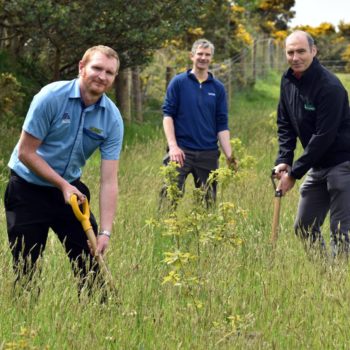Aldi plants 15,000 native trees along the ‘Kerry Way’

New five-hectare native woodland plantation in Muingaphuca will boost local biodiversity
29 May 2020
As part of Aldi’s commitment to planting 100,000 native hardwood trees over the next five years, the group recently planted 15,000 trees on a site in Muingaphuca in the heart of County Kerry. This is in addition to the 16,000 trees that were planted on a site in Rockfield, Limerick in December 2019.
The initiative is the latest step in Aldi’s Carbon Reduction Pledge, which saw it achieve Carbon Neutral status at the beginning of 2019. The move will help to encourage local flora and fauna, while aligning with the government’s aim to plant 22 million trees a year until 2040.
This initial plantation of 16,000 trees will remove as much as 3,000 tonnes of carbon dioxide from the atmosphere, the group calculates. The Muingaphuca plantation will remove a further 2,700 tonnes of carbon dioxide from the atmosphere. This means that Aldi’s first two plantations will sequester a total of 5,750 tonnes of carbon emissions.* The next planting phase will take place within the next 12 months.
Enhancing biodiversity
Working in conjunction with Green Belt, the site underwent a Forest Carbon Woodlands Benefit Assessment. As part of this assessment, it was established that the site was planned sensitively to enhance the neighbouring aquatic feature close to the project boundary, to enhance the local landscape and to create a new and diverse habitat along the ‘Kerry Way’.
Additionally, the site has been planned with significant setbacks throughout, enabling grassland to revert to more natural vegetation, further enhancing biodiversity in the area. The plantation will ultimately create a habitat for foxes, deer, badgers, squirrels, pine martens and many more.
The unique nature of this woodland is the re-establishment of woodland cover in an area with a string history of woodland removal.
‘Real action’
“Climate action is a global priority,” said Green Belt, the organisation which coordinated the project. “The key word to most might be climate; the key word for Green Belt is action,” the statement continued. “Green Belt are delighted to work with Aldi to initiate and deliver step 1 of real action by helping them establishing 10.22 hectares of new native woodland, by planting 31,000 native trees which will over time lead to the capture of 5,785 tonnes of carbon: Real action which will lead to real change.”
Earlier this year, Aldi Ireland also signed up to the All-Ireland Pollinator Plan, taking on a number of initiatives to help Ireland’s native flora, fauna and bees. The group has already begun educating staff and encouraging suppliers to join them in promoting biodiversity, and this new woodland plantation is the next major step in fulfilling the goals set out by the plan.
Since 2012, Aldi has introduced numerous initiatives to reduce its carbon footprint in Ireland. These include increasing the purchase of green electricity to 100 per cent, implementing an ISO 50001 certified energy management system, and investing almost €4m in environmentally friendly refrigeration systems being installed across all new stores.
Aldi has also signed up to the Business in the Community Ireland (BITCI) Low Carbon Pledge, committing to reducing its greenhouse gas emissions by at least 50% by the year 2030.
*(Source: The carbon sequestration figures are based over a 100-year period)



 Print
Print




Fans 0
Followers